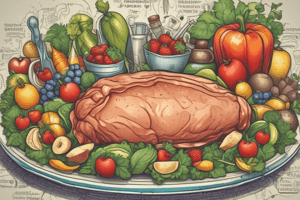Podcast
Questions and Answers
When disease impacts nutritional status, the role of health care professionals is to assist the person in order to cover the individual's need for nutrients and support the metabolic perturbations by nutritional care. This implies the administration of nutrition therapy.
When disease impacts nutritional status, the role of health care professionals is to assist the person in order to cover the individual's need for nutrients and support the metabolic perturbations by nutritional care. This implies the administration of nutrition therapy.
True (A)
Nutrition therapy is a medical intervention requiring an indication and a therapeutic goal that should be applied in accordance with principles and values in multicultural societies.
Nutrition therapy is a medical intervention requiring an indication and a therapeutic goal that should be applied in accordance with principles and values in multicultural societies.
True (A)
Palliative care is specialized medical care for people living with a minor illness, such as a common cold or seasonal flu.
Palliative care is specialized medical care for people living with a minor illness, such as a common cold or seasonal flu.
False (B)
The Ethics of Care can help to understand and analyze the ethical foundations of the practice of clinical nutrition.
The Ethics of Care can help to understand and analyze the ethical foundations of the practice of clinical nutrition.
Nutritional care as an ethical subject is not able to present itself as a legitimate form of care in medical practice.
Nutritional care as an ethical subject is not able to present itself as a legitimate form of care in medical practice.
Enteral and parenteral nutrition are examples of nutrition therapy.
Enteral and parenteral nutrition are examples of nutrition therapy.
Dementia, persistent vegetative state, and terminal illness are considered challenging and extreme situations that question the limits and ethical values at stake.
Dementia, persistent vegetative state, and terminal illness are considered challenging and extreme situations that question the limits and ethical values at stake.
Health care professionals are not responsible for addressing the nutritional needs of aged patients.
Health care professionals are not responsible for addressing the nutritional needs of aged patients.
Nutritional care does not require an indication and a therapeutic goal according to the text.
Nutritional care does not require an indication and a therapeutic goal according to the text.
Palliative care is a form of specialized medical care for people living with a serious illness, such as cancer or heart failure.
Palliative care is a form of specialized medical care for people living with a serious illness, such as cancer or heart failure.
Flashcards are hidden until you start studying




